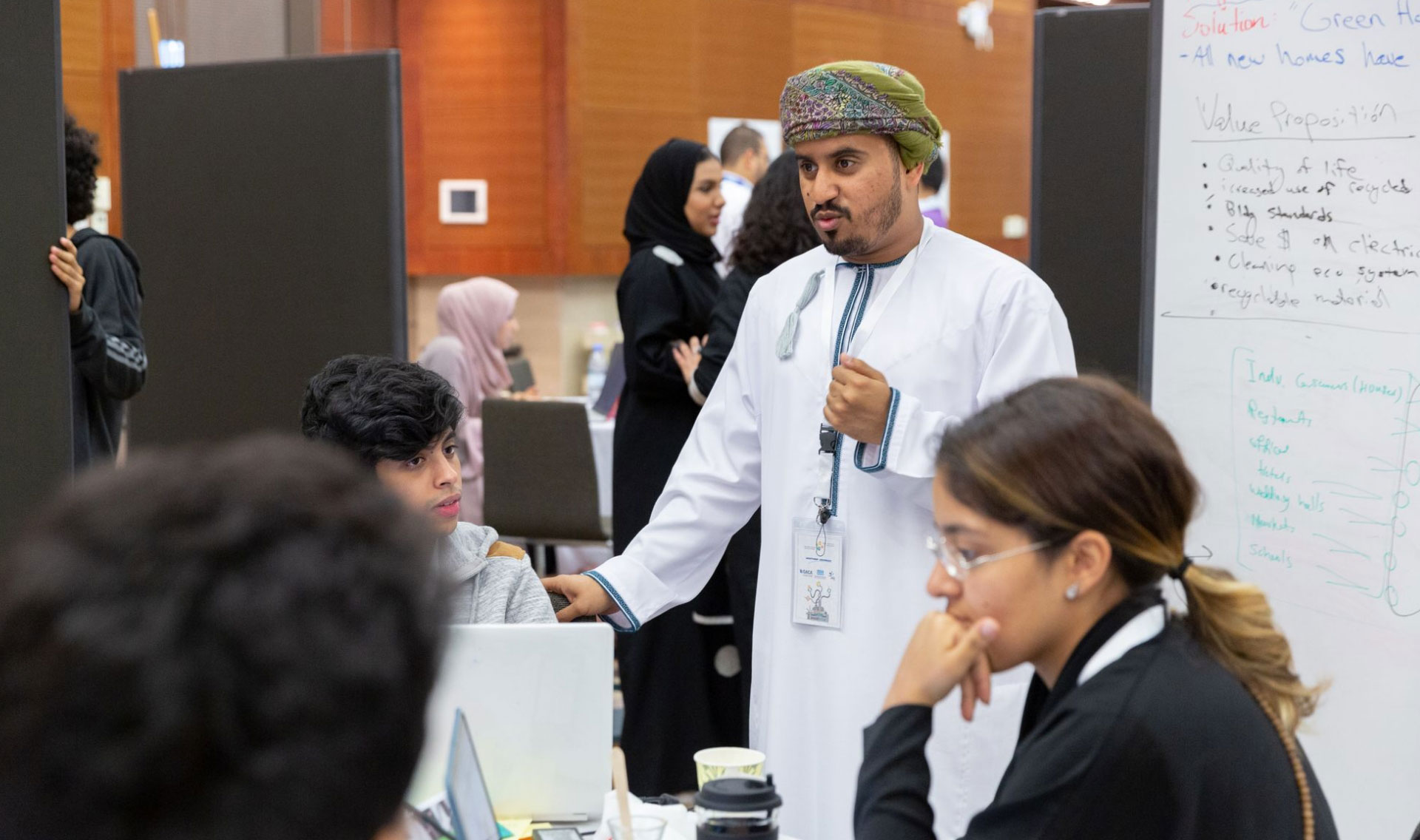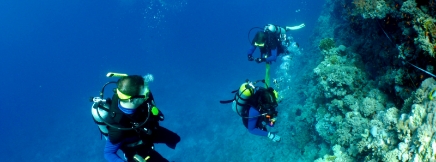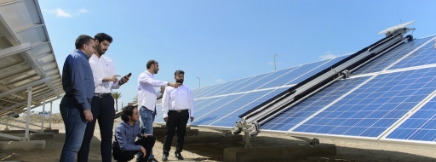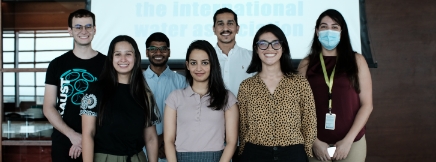COURSES
KAUST was founded over a decade ago to enhance the welfare of society with a special focus on four areas of global significance—food, water, energy, and the environment. We are built on sustainability.
As an IAU WHED-recognized university, we are committed to equipping students with conceptual and practical tools for addressing critical global sustainability challenges. Our academic programs offer an extensive array of graduate courses that cover their subjects in depth while contextualizing them within the UN’s Sustainable Development Goals (SDGs).
All of KAUST’s course offerings address sustainability. But many of our courses directly focus on sustainability. The following list describes the sustainability component of each of these courses and itemizes the SDGs they address.
Decision Making in Sustainability
Focusses on equipping students with analytical and quantitative tools for solving sustainability challenges. Through real-world case studies, students learn to evaluate environmental, social, and economic trade-offs using practical mathematical techniques. The course emphasizes applied decision-making approaches over technical theory, training students to use the appropriate mathematical tools to make informed and efficient decisions in sustainable development, identify improvement areas, and propose data-driven solutions aligned with the United Nations Sustainable Development Goals. Students also develop the ability to communicate findings effectively to both technical and non-technical audiences.
Advanced Environmental Microbiology
Covers the biology, ecology, production, and application of microorganisms for sustainable agriculture, environmental bioremediation, and cleanup according to the concept of microbial resource management
Life Cycle Sustainability Assessment
An introduction to concepts and methods for determining the net environmental, economic, and social impacts of engineering technologies and processes. Also presents analytical tools and resources for evaluating sustainability from a systems perspective. These methods are examined and applied to current engineering issues including global climate change, alternative-fueled vehicles, water management and wastewater treatment, urban development, renewable energy (solar, wind, and biomass), and waste mitigation.
Contemporary Topics
Sustainable process engineering is a methodology to design new and redesign existing processes that follow the principles of green chemistry and green engineering, and ultimately contribute to a sustainable development. The newest achievements of chemical engineering, opened new opportunities to design more efficient, safe, compact and environmentally benign chemical processes.
Sustainability in Chemistry
The course covers the following topics: Introduction to sustainability and nano & porous materials, Sustainable synthesis and characterization of nano & porous materials, Green chemistry, Polymeric membranes for sustainable separations, Preparation & applications of sustainable membrane, Sustainable production of hydrogen by water electrolysis, Sustainable transport and delivery of hydrogen, Sustainable hydrogen storage, Introduction to Ultrafast Fluorescence Spectroscopy, Electron Imaging Methods: Scanning Electron Microscopy & Transmission Electron Microscopy, Time-resolved Electron Imaging Methods: Scanning Electron Microscopy & Transmission Electron Microscopy, Introduction to sustainable organic materials, Synthesis and characterization of sustainable organic materials.
The course focuses on how to improve existing processes to achieve higher purity and yield while reducing raw material consumption. As a result of process intensification, the structure of the process industry is transforming dramatically. Existing design principles and methods are discussed, challenged, and adapted to the new challenges of sustainable development.
Global Geophysics (ErSE 211)
Covers the history of Earth’s climate, the formation of oceans and the atmosphere, biological history, energy balance using the climate model, oceanic and atmospheric circulation, climate change, and coupled ocean-atmosphere-biosphere climate models.
Geological Systems of Arabia
Uses the Arabian plate to explore major geological processes such as plate tectonics, continental accretion, exhumation, fragmentation, the development of sedimentary basins, plate margin and intraplate magmatism, and the formation of hydrocarbon and mineral deposits. Along the way, the course is an opportunity to study climate change, geological CO2 sequestration, and the potential for high- and low-enthalpy geothermal energy.
Geophysical Fluid Dynamics II
Covers climate and climate change, large-scale atmospheric and oceanic motion, fine-scale processes, and other factors influencing the climate.
Atmospheric Chemistry and Transport
An introduction to atmospheric chemical processes and their role in the climate system.
Atmospheric Physics
Covers the main physical processes in the Earth’s atmosphere and their role in the formation of weather and climate.
Enhanced Oil Recovery (EOR)
Provides an integrated workflow for field development and production lifecycle, including secondary recovery evaluation, reservoir screening for tertiary recovery, assessing various EOR schemes, and understanding the limitations of various EOR methods such as CO2 capture.
Energy and the Environment
Covers the relationship between ecosystems in the past and in the present, their energy storage and throughput, and energy production and its side effects through sustainable and unsustainable cycles. Students will analyze the inadequacies of economic theories in fully capturing the relationship between the human economy and the Earth’s economy (i.e., ecology).
Principles of Environmental Sustainability
A general survey of sustainability and water-food-energy systems, anthropogenic action, and climate change.
Selected Topics in Green Process Technology
Explores how the environmental footprint of food, water, and other material production can be reduced.
Water Desalination
Covers theoretical and practical aspects of seawater/brackish water desalination technologies. Topics include desalination processes; system performance; fouling, scaling, and cleaning; water quality and post-treatment; energy consumption; environmental impact; economics; hybrid systems; desalination using renewable energy; and desalination market trends.
Public Health Microbiology
An introduction to the diversity of microbial agents that can impact public health and environmental systems. This course details the microbial hazards found in water, soils, and air, and introduces students to quantitative microbial risk assessment (QMRA).
Marine Ecosystems
An examination of the structure and function of marine ecosystems, this course describes ecosystems from the intertidal zone to the deep sea and outlines ecological principles governing the distribution of organisms and their adaptations to changing environments.
Marine Microbial Ecology
An overview of the structure and function of microbial communities in the oceans, including discussions on novel methods, results, and hypotheses. Organisms that thrive in extreme marine environments such as mangroves and microbial extremophiles are also discussed.
Marine Life (MarS 211)
An overview of marine biology, including the diversity of marine habitats, major groups of taxa inhabiting those habitats, and the general biology of the various taxa. Topics include the impacts of climate change and other anthropogenic impacts in the ocean.
Materials for Energy
A review of the challenges facing materials scientists working in renewable energy and sustainability science and technology, this course aims to give the student a high-level view of current topics in energy harvesting and storage materials.
Funds of Circular Carbon Strategies (ME 252)
An in-depth examination of engineering systems to convert, store, transport, and make use of energy, with emphasis on technologies that reduce or eliminate dependence on fossil fuels and emission of greenhouse gases. Topics include thermodynamics of energy conversion, energy resources, stationary power generation (vapor power cycles, combined cycles, solar thermal systems, nuclear fission and fusion, solar photovoltaics, fuel cells, wind, geothermal), carbon sequestration, alternative fuels (hydrogen, biofuels), and transportation systems (internal combustion engines, gas turbines, fuel cell and electric vehicles).
Sustainable Thermal Technologies (ME 253)
An examination of sustainable thermal technologies, providing in-depth coverage of the working principles, thermodynamics analyses, and developments leading to current thermal systems. The course specifically looks at solar energy (diffuse and concentrated), geothermal energy, waste heat recovery, heat pumps, cogeneration, direct use of heat, and hybridizing with combustion. Broader issues related to integration, economics, and potential for carbon reduction are also discussed.
Renewable Fluid Power
Covers the fundamentals of renewable fluid power technologies including wind, wave, hydro, and tidal. Includes the principles of fluid mechanics for each technology and methods for maximizing efficiency and utilization. System-level analyses are performed to evaluate each resource, its conversion efficiency, and its use as an alternative to traditional sources.
Electrochemical Energy System (ME 256)
An introduction to renewable energy storage and hydrogen as an energy carrier, principles of electrochemical CO2 conversion devices, and electrochemical CO2 reduction.
Climate Change (PSE 205)
An introduction to the fundamentals of climate change, its societal impacts, and proposed solutions from corporate and governmental institutions. The course enhances students’ ability to engage in societal debates and critically assess information from scientific sources. It covers the scientific basis of climate change, historical and present-day climate drivers, and modeling challenges. It also explores observed environmental degradation, urban vulnerabilities, and climate tipping points. The final modules focus on societal responses, including sustainability policies, energy transition, and the financial implications, and opportunities, for businesses and governments.
PROGRAMS AND INITIATIVES
THE WINTER ENRICHMENT PROGRAM (WEP)
This annual two-week program is designed to unleash the creativity of KAUST students, guests, and audience participants.
Since 2010, WEP has proudly hosted Nobel laureates, CEOs, professors from leading universities, elite athletes, artists, and distinguished regional and local leaders and decision-makers, making it a global hub of knowledge sharing.
Although WEP’s theme changes every year, sustainability is a recurring thread in discussions and is reflected across the program’s events and activities.
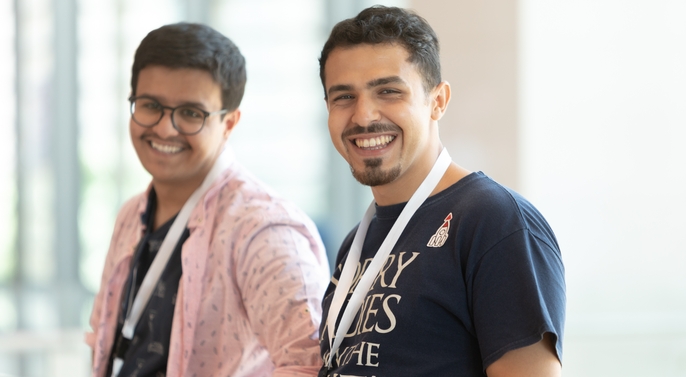
VISITING STUDENT RESEARCH PROGRAM (VSRP)
This unique sponsored program gives students the opportunity to conduct innovative research while offering them an entree to pursue their graduate studies at KAUST. With research opportunities that span the breadth of scientific and engineering fields, VSRP provides students who have drive, an insatiable curiosity, and strong academic performance with an unparalleled opportunity to pursue their research with guidance and support from KAUST faculty mentors.
VSRP accepts students from all over the world regardless of ethnicity, gender, or social background, for an inclusive opportunity to be part of the international research community.

